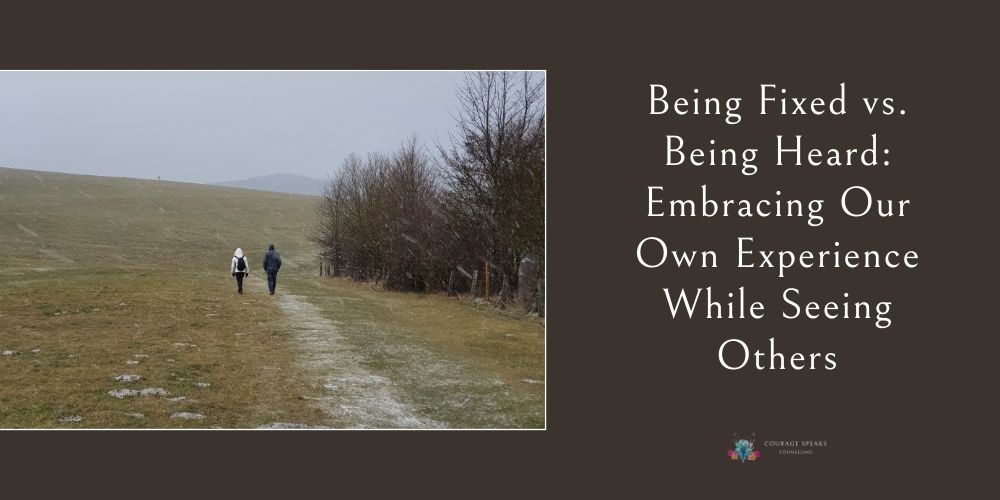In relationships, there’s a temptation to “fix” one another—especially when someone is struggling. It can feel like the natural thing to do. After all, isn’t helping the people we care about a good thing? The problem is, “fixing” often doesn’t come from a place of deep understanding. Instead, it can come from discomfort with what the other person is experiencing. Rather than holding space for their pain, confusion, or unique perspective, we rush to offer solutions, attempting to shape their experience into something that makes sense to us.
But what if we stopped trying to fix and, instead, focused on seeing, hearing, and understanding?
Each of us holds our own experience of an experience. That sounds simple enough, but think of the last time you disagreed with someone about how a shared event unfolded. Maybe you felt overlooked in a conversation, while they remember it as a light-hearted exchange. This is where things get tricky. It’s easy to fall into believing that one of you must be right, which inherently makes the other wrong. But what if both perspectives are valid? What if our individual experience is our truth?
When we try to fix someone, we’re often invalidating their truth. We are saying, “Your experience isn’t quite right, so let me help you correct it.” While the intention might be kind, the impact is often harmful. It strips away the autonomy of the other person’s experience, asking them to adopt ours instead. This doesn’t lead to healing or closeness. It creates distance, fueling feelings of isolation or resentment.
Imagine for a moment the freedom of simply being able to express yourself fully—without worrying that someone will step in to offer advice, argue with your perspective, or try to pull you into their version of the story. That kind of freedom allows us to feel seen for who we truly are, in all our complexity and humanity.
It’s possible to hold onto your own experience while seeing someone else in theirs. We can honor the parts of ourselves that have felt unseen and misunderstood, while making room for the parts of others that are equally yearning to be acknowledged. This doesn’t mean we have to agree, nor does it mean we are responsible for resolving the differences. It simply means we are making space for each other’s reality to exist without trying to alter it.
We’ve been conditioned to believe that relationships are about agreement—that if we’re not on the same page, something is wrong. But relationships, at their best, are about connection, not uniformity. True connection happens when we acknowledge that we can stand in our own truth and still extend compassion and understanding to someone else’s.
So the next time someone shares their experience with you, resist the urge to fix or change it. Instead, try sitting with it, even if it makes you uncomfortable. Notice the parts of you that want to jump in and offer solutions or corrections. Those parts of you may feel like they’re being helpful, but often they’re just avoiding the deeper connection that comes from simply being present with another person’s reality.
And in doing this, you give yourself permission to have your own unique experience of life. You don’t need to apologize for how you see the world, or how you’ve been shaped by it. You don’t need to bend your truth to fit someone else’s narrative. You can hold your own perspective and see others in theirs.
That’s how we build real connection—not through fixing, but through seeing and being seen, hearing and being heard. It’s the experience of being human, together, even when our stories don’t quite match up. And maybe, that’s where the real healing happens.
Embracing Shadows, Illuminating Hope,
Chelsey Fjeldheim, LCSW
Empowering Souls on the Path of Healing
Copyright © 2024 Chelsey Fjeldheim, Courage Speaks Counseling




